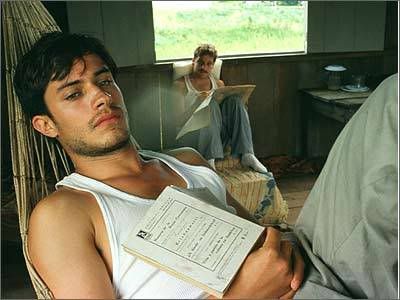Having now seen The Motorcycle Diaries, Bright Star, and The Sea Inside, I figured it was finally time for the follow-up post. I have to say, I was impressed by all three films, and each one had its merits. It's disappointing that these three had such a poor showing at the Oscars in their respective years.




The Motorcycle Diaries was an interesting, if episodic, glimpse into the life of famed revolutionary Che Guevara. What worked best about this approach to Guevara was that it presented him when he was still Ernesto Guevara, a doctor from Argentina who went on a trip around South America with his friend Alberto Granado (played by Rodrigo de la Serna). Gael Garcia Bernal plays Ernesto as fresh-eyed graduate ready to see the world, only to be deeply moved by the injustices he witnesses across the continent. The film doesn't always work; even for a road trip film, it's sometimes too disconnected, with a few unnecessary scenes killing the momentum. Still, it's an interesting glimpse into how Ernesto became Che, and definitely worth checking out.

Bright Star was a charming, elegant, and touching romance based on the relationship between poet John Keats and Fanny Brawn. Aesthetically, it was a marvelous; the film is beautifully shot, and the costumes are magnificently constructed. Though Ben Whishaw and Abbie Cornish give great performances, the real star of Bright Star is writer/director Jane Campion, best known for The Piano. Though many (myself included) have praised Oscar-winner/glass-ceiling-breaker Kathryn Bigelow as one of the finest female directors working today, Jane Campion is the true standard-bearer, proving herself here to be better than many of her contemporaries, male or female. Like the film itself, her talent as a director is subtly beautiful. Someone give her an Oscar already!

The Sea Inside was my personal favorite of the bunch, a deeply affecting, heartbreaking drama based on Ramon Sampedro, who fought the Spanish government for the right to legally end his own life after years of paralysis. Rather than seeming like a Spanish The Diving Bell and the Butterfly (which was made three years after this film), the film takes a pro-euthanasia stance as it supports Ramon's decision, and Alejandro Amenabar's direction reflects Ramon's escapes into his own mind since he can't physically move himself. Javier Bardem, playing Ramon, delivers a singular, heartbreaking performance; why he was ignored for Best Actor in 2004 - I'd replace Johnny Depp with him, easily - is anyone's guess (though the film did win Best Foreign Language Film for Spain). It's a beautiful film, and I highly recommend it.
Comments